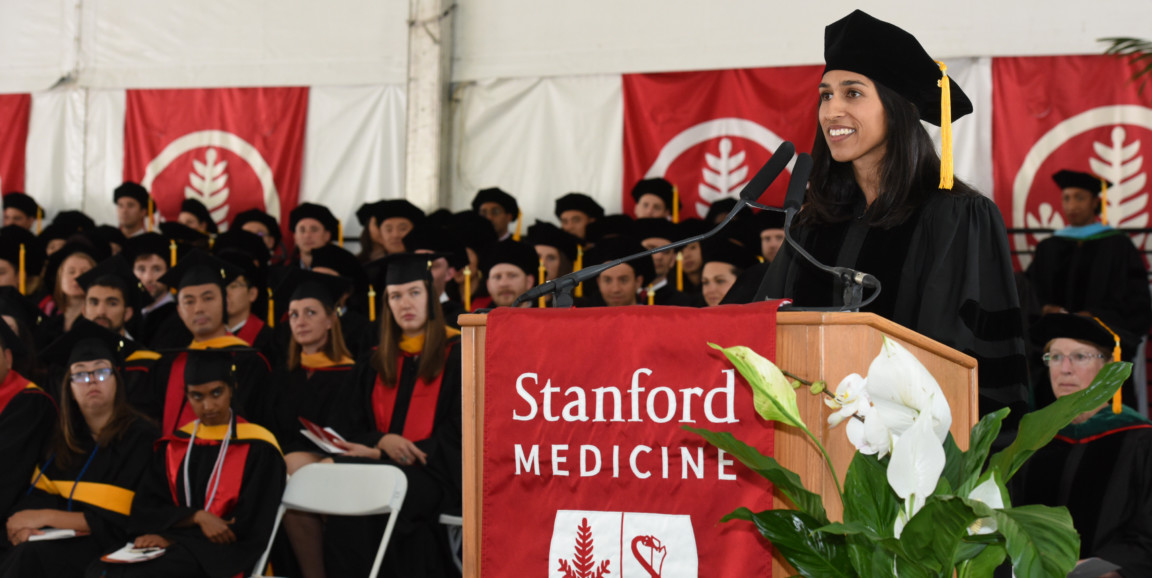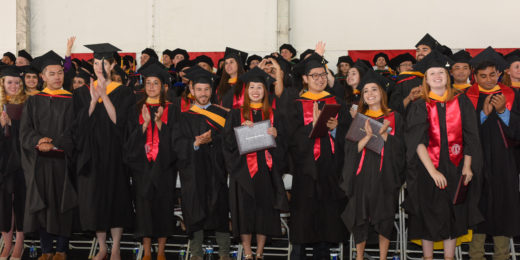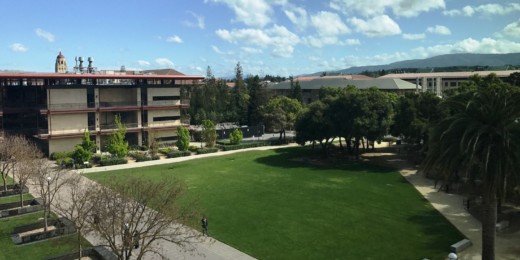For those of us graduating, medical school at Stanford started somewhere between four and 10 years ago. During our first week we had those friendly, casual, getting-to-know-you conversations with our humble but stratospherically capable and exceptional colleagues. Some of us had worked abroad. Others had published field-influencing papers. Many had worked in health care from the perspective of industry, business, and policy. It didn't take long for us to realize that each of our classmates was remarkable and had a unique perspective to bring to our medical education.
Together, we fumbled over our words during our first, awkward standardized patient encounters, offered up our own hands, elbows and radial arteries for IV and arterial access practices; survived neuroanatomy and even came to appreciate the value of the microglia; and helped put together the first ever Stanford med music video. We realized that First Aid isn’t help that you give someone, but a book that you guard with your life during Step 1 study time. We learned how to scrub in and learned that our presentations on rounds, just like our sutures, are either too short or too long, always a bit messy but increasingly good enough to bring it all together.
Now, here at the end of medical school, as I look back I remember most the constant feeling of novelty: the coursework, the physical exam, and, on clerkships, taking care of patients for the first time.
A life of medicine is a life in motion. We spent weeks settling into rotations, finally finding our feet on firm ground, then we switched — leaving behind the teams that we had bonded with for the past month, the patients we had spent hours getting to know and caring for, and the diseases and therapies and operations we had seen and studied. We would show up on a Monday morning to a new team, a new set of patients, and a new medical specialty that we had not yet been exposed to.
That feeling of novelty sometimes came with excitement, maybe for a rotation we were looking forward to, sometimes with a feeling of fear for the unknown that was coming, sometimes a sense of loss for the comfort of the rotation we had just finished. Most often, a little of all three.
For me, I vividly remember this feeling on my first day of my surgery rotation. I scrubbed per the protocol. I gowned and gloved and then stood dead still as far from the operating table as possible, convinced that any movement might result in some sort of colossal contamination. The attending turned to me, recognizing how foreign of a world the OR must have appeared to me, and said, “Surgery is team sport — get in here” and passed me the suction. And with that, my first day of hopefully many days in the operating room was off to a flying start and I quickly forgot how new it had felt only hours before.
That somewhat uncomfortable feeling of novelty we experienced each time we rotated onto a new service, met new patients, and learned about new diseases mirrors so closely how many of our patients feel the first time they walk into the hospital, the first time they receive a new diagnosis, or even the first time they encounter new challenges in diseases they know more intimately than we do. For those of us pursuing research careers or careers in business, it's the feeling of pushing your projects, your companies, your students, and your employees into new spaces and new endeavors where what lays ahead isn’t quite known.
I hope that by remembering that complex feeling of novelty we became so familiar with as medical students we'll be better caregivers for our patients, better team members for those who look up to us, and better leaders as that feeling of newness is encountered down the road.
So, for those of us you starting residency in just a few days — and for others, too: Lean into the feeling of novelty. It’s where all great things start.
Charlotte Rajasingh, MD, is a Stanford Medicine graduate and a resident in general surgery at Stanford. This is an excerpt from her recent commencement speech.
Photo by Steve Fisch






